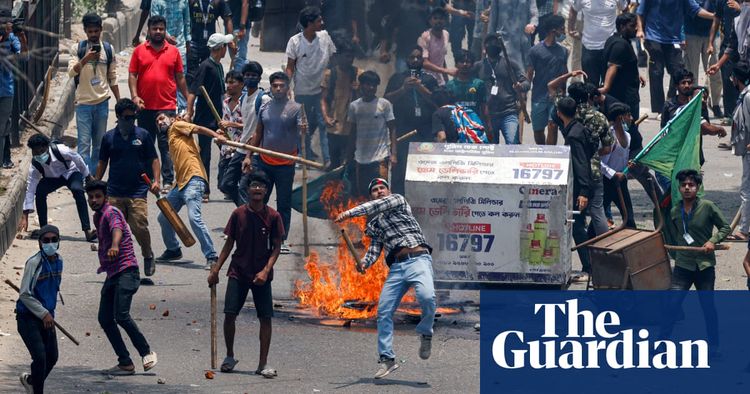Protesters attack Bangladeshi state broadcaster after PM’s call for calm

Students from Bangladesh have ignited the state broadcaster's building just one day after the prime minister, Sheikh Hasina, went on the network to try and reduce the growing conflicts that had resulted in the deaths of 39 individuals.
On Thursday, a large group of demonstrators gathered to protest against the current hiring regulations for civil service positions. The situation escalated when conflict broke out between the protesters and riot police, who used rubber bullets to disperse the crowd. The protesters then pursued the police officers as they retreated to BTV's main office in Dhaka.
The angry group then lit on fire the main building of the network's reception area and many cars parked nearby, as reported by a BTV spokesperson to AFP.
The person on TV mentioned that numerous individuals were stuck inside when the fire began to spread. Another representative from the network later informed AFP that they had successfully removed everyone from the building.
The 76-year-old Hasina administration has instructed schools and universities to shut down indefinitely as police increase their efforts to manage the worsening law enforcement situation.
The leader showed up on the TV channel on Wednesday night to speak out against the killing of protesters and promise that those guilty would face consequences no matter their political beliefs. Unfortunately, the situation on the streets escalated despite her plea for peace, with law enforcement once again using rubber bullets and tear gas to try and disperse the protests.
According to the information gathered by AFP from hospitals, a total of 32 people lost their lives on Thursday, in addition to the seven who were killed earlier in the week. Many more individuals were injured, with the number reaching into the hundreds. Reports indicate that police firearms were responsible for the majority of these fatalities, accounting for at least two-thirds of the deaths recorded.
"We have seven deceased individuals here," stated a source at Uttara Crescent hospital in Dhaka, who requested to remain anonymous for safety reasons. "The initial two were students with wounds from rubber bullets. The remaining five had been shot."
Almost 1,000 people were taken to the hospital to receive medical treatment for injuries they got from confronting the police. The official mentioned that a lot of these individuals had been hit by rubber bullets.
According to Didar Malekin from Dhaka Times, his reporter Mehedi Hasan was tragically killed while reporting on conflicts in Dhaka.
There was unrest in many cities in Bangladesh as police clashed with protestors who were blocking roads and highways.
The helicopters saved 60 police officers who were stuck on the rooftop of a building at a Canadian University where there were intense clashes in Dhaka. The elite Rapid Action Battalion police force reported the incident.
Throughout this month, protestors have been rallying consistently to call for an abolishment of the quota system that allocates over 50% of civil service positions for certain designated groups, such as the offspring of veterans who fought in the 1971 liberation war against Pakistan.
Some people are saying that the program favors children of those who support the government led by Hasina, who has been in power since 2009. She won her fourth election in a row in January after a vote where there was no real opposition. Her government is being criticized by human rights organizations for taking control of state institutions and silencing any opposition, sometimes even resorting to killing opposition activists without a fair trial.
Mubashar Hasan, a specialist on Bangladesh who works at the University of Oslo, mentioned that the demonstrations have expanded to encompass a broader feeling of dissatisfaction with Hasina's authoritarian governance. He noted that the protestors are objecting to the oppressive actions of the government and are challenging Hasina's leadership, claiming that she is maintaining control through coercion. According to Hasan, the students are explicitly labeling her as a dictator.
People in Bangladesh experienced a lot of issues with their mobile internet on Thursday. This happened two days after internet companies blocked access to Facebook, which was a crucial platform for organizing protests.
Reuters said that on Friday, there were problems with phone calls from other countries not going through and internet calls not working. Some Bangladeshi newspapers' websites were not updating and their social media accounts were inactive.
The government has told the network to be disconnected by the Telecommunications Minister, Zunaid Ahmed Palak. He mentioned before that social media is being used as a weapon to spread false information, which is why the government is limiting access.
In addition to police efforts to control the situation, protestors and students aligned with the ruling Awami League party have also engaged in street clashes using bricks and bamboo sticks.
Reporting from Dhaka with the Agence France-Presse and Reuters news agency

































































